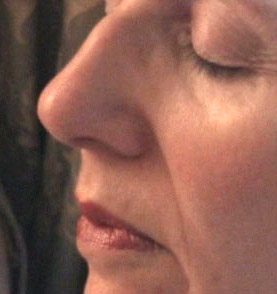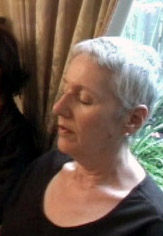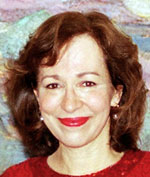|
|
|
My life is not
this steeply sloping hour in which you see me hurrying."
- Rainer Maria Rilke |
An Invitation to Learn
Mindfulness-Based Stress Reduction |
| |
 Photo by Barbara Carr
| |
|
|
Learn to live with greater vitality, health and well-being at an
eight-session Mindfulness-Based Stress Reduction program. Presented by
the Mindfulness-Based Stress Reduction Center of New Jersey and hosted
by Temple Sinai, Summit NJ, the program offers powerful methods for
reducing stress in your everyday life.
|
|
|
I am not I
I am not I,
I am this one
walking beside me whom I do not see,
whom at times I manage to visit,
and whom at other times I forget,
who remains calm and silent while I talk,
and forgives gently, when I hate,
who walks where I am not,
who will remain standing when I die..
Juan Ramón Jiménez from Lorca and Jiménez, Selected Poems. Trans. Robert Bly, Boston: Beacon Hill Press, 1973
My ears have found the sermon dull and stale; But in the woods outside-- the nightingale! Masoaka Shiki (1866-1902)
|
|
Upcoming Events Free Introductory Talk Wednesday, November 16, 2011
7:30-9:00 pm
Temple Sinai
208 Summit Ave
Summit NJ 07901
Eight-week program begins Jan. 25, 2012
For more information or to reserve a place for talk or course, please contact Dr. Diane Handlin at 732-549-9100 or diane@drdianehandlin.com
For more information go to
www.mindfulnessnj.com
(Please note that MBSR is an educational course
and not psychotherapy. If you suspect that you have medical or
psychological issues, please pursue appropriate treatment.) |
|
Worthy of Note
Jon Kabat-Zinn, keynote speaker
at
Creating a Mindful Society,
A Landmark Gathering of the Mindfulness Community
September 30 - October 1, 2011
New York Society for Ethical Culture, NY
A Psychologist's Journey:
Mindfulness-Based Stress Reduction
Diane Handlin, Ph.D.
Somerset Psychological Association,
December 2012
Jon Kabat-Zinn
Google Tech Talk,
on
YouTube, March 8, 2007
|
|
|
|
|
|
|
|
|
Dear Reader,

| |
Sitting meditation
|
I am writing on a beautiful
day after a summer of extreme weather punctuated by Hurricane Irene, a
reminder of our humble place in the

| |
MBSR student in
Diane Handlin's class
|
grand scheme of things. I am dedicating this issue of The Living Moment newsletter to those who have suffered because of the recent storm.
Because
a number of people interested in MBSR have made inquiries about work
being done related to physical pain, I am including an excellent article
that describes some of the current thinking on pain relief which
includes the work done with Mindfulness-Based Stress Reduction developed by Jon Kabat-Zinn and his colleagues at UMass Medical School's Stress Reduction Clinic.
Scientific observation and human introspection have been more closely
integrated and become a beneficial partnership thanks to the development
of brain imaging technology. For example, Rick Heller
recently reported on new developments in neuroscience that validate the
way mindfulness practice can help alleviate pain (Buddhadharma,
Fall 2010, pp. 34-91). He reviews pain theory from Descartes through
the present, including Ronald Melzack, Kenneth Casey and Patrick Wall's
development of gate control theory which describes how pain symptoms are intensified by the type of attention given to them.
If you want to read the entire Heller article, please
click here.
Also significant, Naomi Eisenbeger, among others, has discovered that
the prefrontal regions of the brain (the parts associated with conscious
thought) regulate the emotional areas.
If the prefrontal areas determine that what is going on is acceptable,
they seem to inhibit the neural alarm system in the area of the
cingulate in the brain. This has led to research that determined that
when pain sensations are experienced without fear, suffering is
lessened.
In a similar vein, Ronald Siegel, a long-time
practitioner and teacher of mindfulness meditation, as well as a person
who has suffered from extreme back pain, in his book, Back Sense,
discusses how pain can be amplified through a feedback loop.
Fear sends signals to our muscles and they become tense.
If the muscles remain tense for a long time, they begin to hurt. The
hurt can lead to more fear which in turn tenses the muscles even more.
Jon Kabat-Zinn's program of Mindfulness-Based Stress Reduction (which has been in existence at the Center for Mindfulness at UMass Medical School since 1979) was originally designed as an educational course
to help people suffering from intractable physical pain, but was
expanded over the years to address the larger issue of how human beings
can respond to a variety of other stressors and their physiological
consequences.
Kabat-Zinn's work draws on Budddha's insight from 2600 years ago that
human suffering is composed of two darts or arrows.
 | Diane Handlin, Ph.D.
Founder and
Executive Director |
The
first of these darts is the painful event(which inevitably occurs in
life). The second dart, however, is what our minds do with the first
event and is comprised of the stories we tell ourselves about the
meaning of the event in relation to our identity, e.g., "I am a cancer
patient, a person who has suffered loss, a back injury victim." This
kind of automatic contraction triggers a myriad of destructive
biochemical reactions.
Wishing you a restorative transition
from the tumultuous summer to the beginning of a new and potentially
restorative and vivifying fall.
Diane Handlin, Ph.D.
Licensed Psychologist
|
|
The Living Moment
There is a stillness at dawn
asking for me
I hear the note not played
I see the line not written
I understand the word not spoken
I am in stillness
I am the Living Moment
uncommitted.
Cliff Woodward
(with Stephen Damon)
|
"As
to the value of the course, I would note that the group workshop
designed to work through Jon Kabat-Zinn's curriculum is very effective.
The workshop / course added a great deal of depth and opened my mind to
a different way of looking at things and fostered exploration. When
mindfullly present, time seems to expand for me. I relax, freed from
thinking about the next place I have to be or the next thing I have to
do ... I have discovered that if I hold off, I usually do not act along
the lines of my first reaction. I've realized that I almost always have
time not to act immediately. I've also rediscovered my happy me, what I
remember from soooo long ago ..., and that is really wonderful."
- Jane Dobson, Corporate attorney
|
IMPORTANT NOTICE: Although Dr. Handlin is a licensed psychologist and has a separate psychology practice, please note that this is an educational course
and not psychotherapy. In addition, information contained in this
document is informational and not to be construed as medical advice. If
you suspect you have medical issues, please pursue appropriate
treatment. Mindfulness-Based Stress Reduction is a separate educational course
for those interested in developing mind-body connections. MBSR is a
non-psychological service offered apart from Dr. Handlin's psychology
practice and is not meant to substitute for personal or professional
psychological advice which must be received from a licensed mental
health professional.
NJ Lic. #3306, NY Lic. #015840 |
Mindfulness-Based Stress Reduction Center of New Jersey™328 Amboy Ave, Metuchen NJ 08840 Tel: 732-549-9100,
www.mindfulnessnj.com
|
|
|